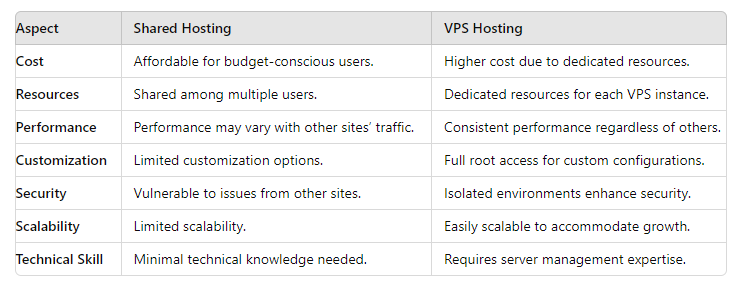The difference shared hosting and VPS hosting makes when it comes to selecting a web hosting plan can enlighten you on the kind of choice that would be good for your website digital needs. Every hosting types will have unique individual Pros and Cons based on what type of performance / flexibility you need from your hosting solution at last cost stand as other factors. Today, we will get into details of the differences between shared and VPS hosting to understand which one best suits your needs.
What is Shared Hosting?
Shared hosting this most popular cheapest type of web-hosting especially for the beginners and small websites. Shared hosting: Multiple websites occupy a single server and all the CPU, RAM, disk space are utilized by the sites hosted on that particular virtual server. This implies that your website will share the server with a few other websites, and use similar resources.
Pros of Shared Hosting
Affordability:
As compared to all other types of web hosting, it is cheaper as well so if you are running a personal blog or starting up your small business then shared hosting can be easily affordable. This makes costs sensible as the servers are shared by different users.
Ease of Use:
You can completely forget the server maintenance or any technical setup using shared hosting. From backend administration and management to setting up other things like taking a backup of the website, you can forget about all that as hosting providers takes care of these processes.
Support and Maintenance:
Hosting providers also provide support services, to help you solve those problems. A server provider takes care of all the server management and upkeep, which makes it an excellent choice for those who are less experienced.
Cons of Shared Hosting
Limited Resources:
Since you are sharing resources with other sites, your page might be slow at times of high traffic or if a particular server is facing very heavy load (due to another site on that same sever).
Lack of Customization:
In shared hosting environments, one can do minimal software installations and configurations. The server settings are not strong enough to run some apps.
Security Concerns:
Multiple Sites Sharing a Server – This is okay when it comes to functionality, but not ideal for security measures. This is a concern because if one site on the server is hacked, then this can put your website at risk also.
What is VPS Hosting?
VPS hosting (Virtual Private Server web hosting) divides a physical server into multiple virtual servers, giving the website owners to create dedicated resources. A VPS runs its own copy of an operating system and each virtual server works similar to a standalone resource which focuses on dedicated resources with more control than shared hosting.
Pros of VPS Hosting
Dedicated Resources:
What you get from VPS hosting is dedicated CPU, RAM and disk space which results in highly stable performance irrespective of traffic on other websites.
Customization and Control:
VPS hosts all root access and allows you to configure server settings, install your own software or run applications that are full-featured! More secure than shared hosting, more control over your environment
Enhanced Security:
Enhanced server security in private environments. The problems of any other websites won’t cascade onto your own so you have a better level of safety for both your data and applications.
Scalability:
VPS hosting enables you to easily add more resources as your site grows, which helps keeps pace with increased traffic without any loss in performance.
Cons of VPS Hosting
Cost:
VPS hosting is priced slightly higher than shared web servers as a result of extra resources and functions. If you have a small site, it may not be the most cost effective (others can do similar things with less overhead)
Technical Knowledge Required:
VPS Hosting is a high-value service that requires some technical skill to manage even with unmanaged hosting. Users should have a basic understanding of server management and troubleshooting.
Responsibility:
Some providers offer managed VPS hosting, while others provide unmanaged options and expect you to maintain your virtual server with operating system updates, patches etc. in case of an emergency so be sure the provider offers 24 x7 support!
Key Differences Between Shared Hosting and VPS Hosting:

Which Hosting Option is Right for You?
Choosing between shared hosting and VPS hosting depends on your website’s requirements, budget, and level of technical expertise.
When is Shared Hosting Right for You?
Cost-Effective: If you are looking at a lower budget and with less requirements.
Small Websites – Ideal for personal blogs, portfolios or small business websites with light to moderate traffic.
Simple way to host: Good for beginners who need hosting without the sophisticated part.
When to Choose VPS Hosting:
Performance Requirements: Medium and large websites, online stores an applications that require more performance or resources.
Customization: Do you require specific software installs, settings or server optimizations.
Security Considerations: If the data security of your site is in a different environment than that of other sites.
Scalability: for the businesses having increasing traffic and may require scalable resources in future.
Conclusion
Shared hosting and VPS Hosting, both are good on their own place with positive & negative sides and the priority is what do you need. If you are just beginning out and on the lookout for a low value with minimal management, shared web hosting can be potential. Conversely, if you require more power and growth options then going with VPS hosting would probably be a better idea.
Assess Your Current and Future Website Needs, Budget And Level of Technical Expertise In making the right choice. Previously mentioned remember one thing more that when your website will grow up you can shift from shared hosting to VPS Hosting for better performance.
Choose your plan at WayToHosts.com, find the one






